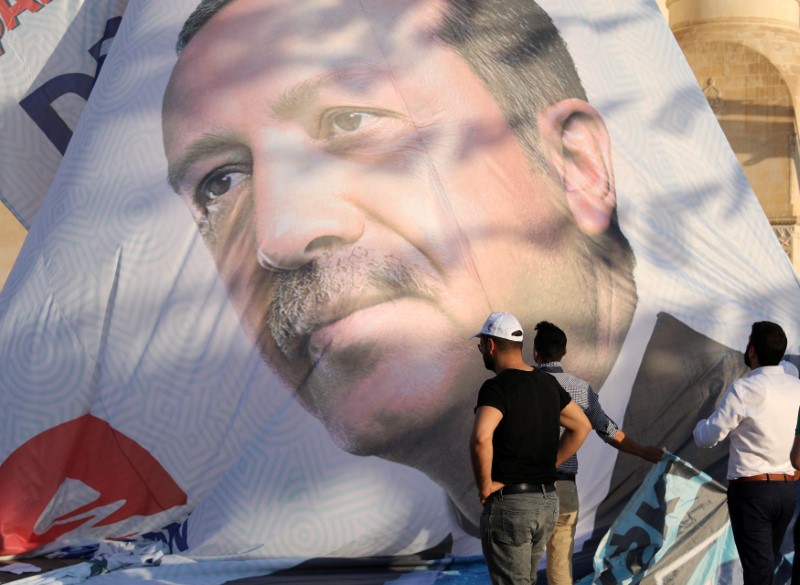By Tuvan Gumrukcu and David Dolan
KONYA, Turkey (Reuters) - In a dusty business park in Konya, Turkey's conservative industrial heartland, Ahmet Hakan Umit sells imported machine tools that are quickly becoming too expensive for his customers.
Sales are down as much as 30 percent this year as a deep dive in the lira currency has pushed up the cost of the computerised lathes he imports from Asia.
"I'm scared. Even one deal falling through can mean a huge setback," the 25-year-old finance director of Umit Makina said looking out on a showroom filled with Samsung (LON:0593xq) machine tools costing as much as $350,000 (£264,222) each.
President Tayyip Erdogan's comments that he wanted greater control of monetary policy after Sunday's elections sparked the lira's latest sell-off, forcing the central bank to hike rates aggressively.
But the currency's 20-percent slide and higher interest rates don't appear to have eroded the support in Konya for Erdogan and his Islamist-rooted AK Party, thanks to religious loyalty and a newfound prosperity over the party's 16-year rule.
Umit doesn't plan to vote for the AKP in the parliamentary and presidential vote, but he expects it to win.
"Many firms are unhappy right now, but people will keep voting for the same government."
Known as one of Turkey's most pious places, Konya has been a bulwark of support for the AKP: nearly 75 percent of the city's votes in 2015 parliamentary elections went to the ruling party.
The city of 2 million has more recently become a symbol of what can be achieved in the long-neglected central Anatolian heartland, boosted by the AKP's 47 billion lira ($10 billion) of investments including roads, hospitals and industrial zones.
Under Erdogan, Konya and neighbouring cities have become known as "Anatolian tigers" for their fast growth and entrepreneurial zeal.
They are also home to a new class of conservative industrialists who, like Erdogan, see themselves as at odds with the secular establishment that dominated society and business for decades and shut out the religious Turks who form the backbone of AKP support.
The most popular, and divisive, politician in modern Turkish history, Erdogan has more recently overseen a widening crackdown against opponents, further unnerving global investors.
'SEE TURKEY'
Erdogan gazes back from nearly every billboard in Konya, and sometimes buildings and minibus taxis.
"Look at Konya, See Turkey," reads one banner draped from an office building. There is a high-speed train, a tram, shopping centres and high-rise residential buildings.
Fatma, who didn't give her last name, is sales manager at a company selling bathroom fixtures. Surrounded by PVC pipes and brass fittings, she rattles off the changes in her more than 15 years at the company.
"When I started, we had a 1996 model car, a heater and three employees. Now, we have four trucks, six commercial vehicles, 13 staff and countless customers," she said.
"Erdogan has so far delivered on everything he's promised and I think he'll continue to do so."
Konya's international exports reached $1.5 billion in 2017, from $100 million in 2001, according to the local chamber of commerce. There are 10 industrial zones in the province, with a total of 1,687 companies.
Financial markets think Turkey needs to focus on fighting double-digit inflation and are concerned about the plans by Erdogan, a self-described "enemy of interest rates", to seek more influence over the central bank.
His views resonate in Konya.
"The interest rate hike hurt us, and it needs to be lowered after the elections," said Durmus Ali, the marketing manager of Basak Ticaret, which sells welding machines.
Some of the machines in the Basak Ticaret showroom were emblazoned with "Made in Turkey". Ali said they were assembled in a Turkish factory from U.S. parts.
FAST GROWTH
Turkey's economy grew 7.4 percent in the first quarter, but there are signs of strain. Critics say Turkey relies too much on construction and private consumption fuelled by debt, and needs to boost household savings.
While the country has become a major exporter - exports reached $157 billion last year - much of the intermediate goods it uses in production come from overseas. Economists say Turkey still doesn't produce enough higher value-added goods itself. To do that, and move up the value production chain, would require deep structural reform and an overhaul of the education system.
As of April, the private sector had $225 billion in long-term overseas loans, almost all of that in dollars or euro, central bank data shows. Turkish companies have been drawn to overseas loans because of the lower interest rates, but the decline in the lira means debt-servicing costs are rising.
Ratings agencies have sounded the alarm. This month Moody's cut its ratings on 17 Turkish banks, citing the rising costs of their foreign currency funding. Erdogan has portrayed such criticism - and the sell-off in the lira - as an attack by foreign powers bent on undermining Turkey.
He blames the agencies and a shadowy "interest rate lobby" for the lira's woes.
In his honey store in a shopping mall, Bunyamin Mutlu breaks up a honeycomb, scraping sticky liquid into a small vat. He has voted for the AKP in every election but one, when he voted for the nationalists. Erdogan, he says, is the best leader in the Turkish republic's 90-year history.
"Despite the attacks of foreign powers and the interest rate lobby, we're still standing tall," Mutlu said.
"We have potential for much more and we can realise this after the elections."
